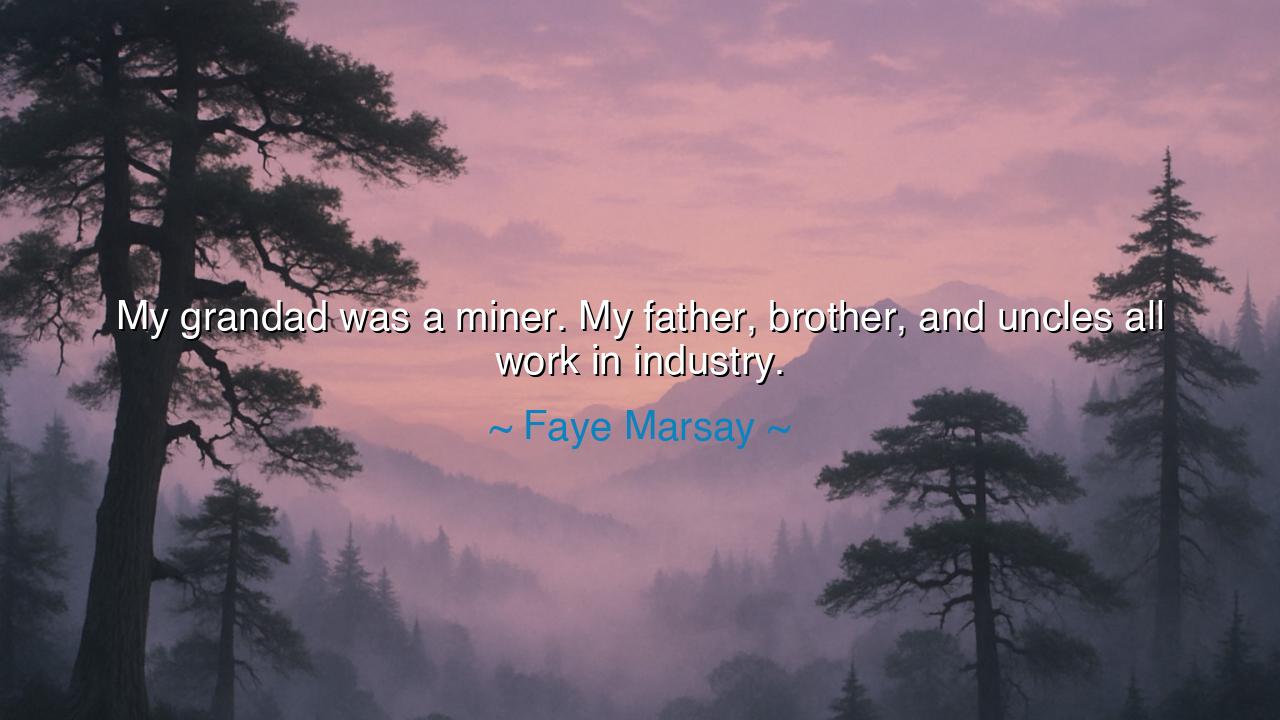
My grandad was a miner. My father, brother, and uncles all work






Hear the words of Faye Marsay, who spoke with reverence for her lineage: “My grandad was a miner. My father, brother, and uncles all work in industry.” Though simple in their utterance, these words are heavy with the weight of ancestry, like stones laid carefully to form the foundation of a great temple. They tell of labor passed from generation to generation, of hands hardened by toil, and of a family bound together by the dignity of work.
The miner, deep beneath the earth, is a symbol of sacrifice and perseverance. In darkness, he searches for light, drawing forth the hidden treasures of the world at great cost to his body and spirit. From this root springs the family tree, each branch reaching toward the future yet nourished by the struggles of the past. The father, brother, and uncles, though their labor may differ in form, carry the same spirit of endurance, their sweat mingling with that of their forebears.
Marsay’s words remind us that no soul stands alone. The work we do is often shaped by those who came before, and the paths we walk are worn by the footsteps of our ancestors. To speak of one’s family is to speak of a living history, a story written not with ink but with calloused hands and weary hearts. In honoring this story, we keep alive the voices of those who labored so that we might rise.
Let future generations remember this: greatness does not always dwell in palaces or in the halls of kings. It lives also in the coal-dusted hands of the miner, in the steady rhythm of the factory, and in the unseen sacrifices of those who build the world stone by stone. Through their industry, they forge not only tools and goods, but the very legacy upon which their children will stand.






TKThien kim
This quote reminds me of how family traditions and careers can be passed down through generations. However, with modern changes in the workforce, I wonder—are industries like mining, which were once central to working-class families, still as prominent? How do younger generations reconcile the desire to forge their own paths with the weight of family tradition? Is it a source of pride or pressure?
QTCu Quang Thang
I find this quote intriguing because it brings up the idea of legacy. It makes me think about how family history and societal expectations can shape the careers of future generations. In today’s world, are industries like mining still as central to people’s identities, or has there been a shift towards more service-based or tech-driven industries? How do you think these shifts are affecting the workforce and family dynamics?
GDGold D.dragon
The quote seems to speak to the pride in following in family footsteps, but it also raises a question—how much choice do individuals have when their family’s career path is so ingrained in their history? Is it empowering or burdensome to follow a well-trodden path, especially in industries that have historically been physically demanding? What happens when someone in such a family chooses a very different career?
MCBui Minh Chau
It’s fascinating to hear about Faye Marsay’s family history. It makes me wonder how many people in our lives are shaped by such strong industrial traditions. How do these family roles influence the way we view work, success, and career paths? Do you think this kind of familial influence still holds the same weight in modern times, or is there a shift toward more diverse career choices?
AA02 T?a? ?o?? a? a'5
This quote really made me think about the generational connection to hard work and the industries that have shaped families. It’s interesting how Faye Marsay highlights the continuity of this work ethic through multiple generations. Do you think this kind of tradition strengthens family bonds, or does it limit personal choices for the younger generation? How do you think such a legacy impacts a person’s identity and career decisions?